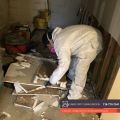How Mold Affects Indoor Air Quality

Indoor air quality (IAQ) plays a crucial role in maintaining a healthy and comfortable living environment. Unfortunately, mold growth can have a significant impact on IAQ, leading to a range of health issues and overall discomfort. Mold is a common fungus that thrives in damp and humid conditions, and when it colonizes indoor spaces, it releases airborne spores that can negatively affect the air quality. In this article, we will explore how mold affects indoor air quality and the potential health implications associated with mold exposure.
Mold Spores and Airborne Contamination
Mold reproduces by releasing tiny spores into the air, which are invisible to the naked eye. These spores can be easily inhaled and are a major contributor to indoor air contamination. When mold grows indoors, whether it's visible or hidden, it releases vast quantities of spores into the air, making mold a significant contributor to indoor air pollution.
Health Effects of Mold Exposure
Exposure to mold spores can lead to a variety of health issues, especially for individuals who are sensitive or allergic to mold. Common symptoms of mold exposure include:
- Nasal congestion and sneezing
- Coughing and throat irritation
- Wheezing and shortness of breath
- Eye irritation and redness
- Skin rashes or irritation
- Exacerbation of asthma symptoms in asthma patients
In some cases, prolonged exposure to mold can lead to more severe health problems, such as respiratory infections or aggravation of pre-existing respiratory conditions.
Mycotoxins and Secondary Metabolites
Apart from spores, some mold species produce mycotoxins and secondary metabolites, which are toxic substances that can become airborne and further degrade indoor air quality. Mycotoxins are particularly concerning as they can be harmful when inhaled or come into contact with the skin. These toxins are released by certain types of mold and can persist in the air and on surfaces even after the mold is removed.
Musty Odor
In addition to the direct health effects of mold exposure, mold growth can also lead to a musty and unpleasant odor. The smell is caused by microbial volatile organic compounds (MVOCs) released by the mold as it grows. This musty odor can permeate the entire indoor space, making it uncomfortable to live in and reducing overall indoor air quality.
Mold Colonization of HVAC Systems
Mold can find its way into HVAC (heating, ventilation, and air conditioning) systems, where it can spread and contaminate the air throughout the entire building. When mold colonies grow in HVAC ducts, the system can distribute mold spores and toxins to various rooms, further degrading indoor air quality and exposing occupants to mold contamination.
Hidden Mold Growth
One of the most concerning aspects of mold is its ability to grow in hidden and inaccessible areas, such as behind walls, under floors, and in ceiling cavities. Hidden mold growth can continue unchecked for extended periods, releasing mold spores and toxins into the indoor air without immediate detection. As a result, occupants may experience health issues without knowing the root cause.
Prevention and Remediation
Preventing mold growth is essential to maintaining good indoor air quality. Key prevention measures include:
- Controlling indoor humidity levels (aim for humidity below 50%)
- Promptly addressing water leaks and moisture issues
- Proper ventilation to reduce humidity and allow fresh air circulation
- Regularly inspecting and maintaining HVAC systems
In cases of existing mold infestations, professional mold remediation is crucial to effectively remove mold and improve indoor air quality. DIY attempts at mold removal can often lead to inadequate cleanup, leaving behind hidden mold colonies that continue to affect IAQ.
Conclusion
Mold can significantly impact indoor air quality, leading to a range of health issues and discomfort for occupants. Mold spores, mycotoxins, and musty odors can contaminate the air and contribute to poor IAQ. Preventive measures, such as controlling indoor humidity and addressing water issues promptly, are essential in limiting mold growth. If mold is already present, seeking professional mold inspection , testing and remediation services is critical to ensure complete removal and restoration of healthy indoor air quality. By addressing mold issues proactively, homeowners can create a safer and more comfortable living environment for themselves and their families.
Bayareamoldpros is a leading mold inspection and mold testing company providing quality mold analysis services and helping families & businesses overcome the devastating setbacks caused by mold. Bay Area Mold Pros suggests every homeowner in the San Francisco area should get periodic mold inspections. Bay Area Mold Pros is available from 7am to 7pm to speak with those who want to request an inspection on their property.To schedule our mold inspection & mold testing services visit our website bayareamoldpros.com either email us or fill in the contact form on our website. We can be reached 24/7 at (650)762-6228.



